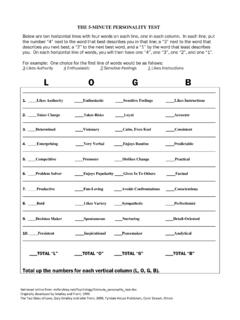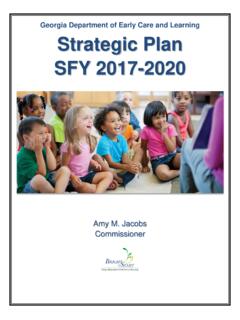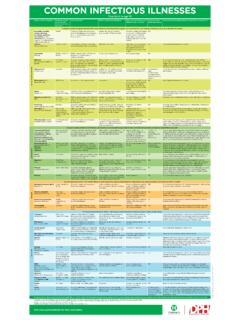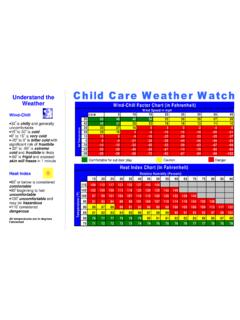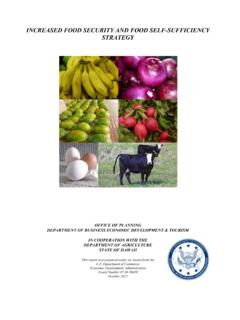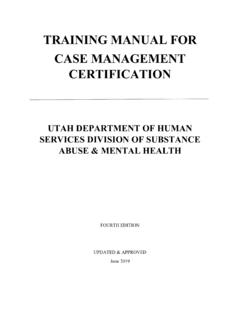Transcription of CRRSA & ARPA Spending Plan - decal.ga.gov
1 1 CRRSA & ARPA Spending Plan This document describes the Georgia Department of Early Care and Learning s (DECAL) proposed plan for distributing remaining funds from the federal Coronavirus Response and Relief Supplemental Appropriations Act ( CRRSA ) and from the American Rescue Plan Act (ARPA). The Appendix provides an update of current or past projects related to these legislative acts as well as funding provided through the Coronavirus Aid, Relief, and Economic Security (CARES) Act. Through the CRRSA , DECAL has received $403,660,875. The purpose of CRRSA funds is to help mitigate negative financial impacts of the COVID-19 pandemic on Georgia s child care industry and to provide additional supports to Georgia families in accessing child care. Through the ARPA, DECAL has received $1,572,459,162.
2 ARPA funding includes two distinct awards with different funding requirements and Spending deadlines: $968,278,648 of ARPA funds are earmarked as stabilization funds and are intended to support eligible child care providers as the state continues recovering from the pandemic. These funds will help ensure the stability of Georgia s child care industry. $604,180,514 of ARPA funds are allocated as additional Child Care and Development Fund (CCDF) dollars. These funds can also be used to provide supports for child care providers, families with young children, and the state s early care and education (ECE) workforce while also adding resources to support the state s ECE infrastructure, raising child care quality, and increasing access to care. Following are four projects that DECAL is in the process of implementing.
3 These projects are based on DECAL priorities of stabilizing Georgia s child care industry through the pandemic and recovery, increasing access to high quality child care for all families of young children, and supporting the state s ECE workforce. The projects are aligned with feedback DECAL has received from providers, families, the workforce, and other stakeholders. DECAL is continuing to engage with stakeholders to identify additional projects that will maximize the impact of this historic funding. 1. STABLE 4ward Funded by the ARPA stabilization funds, this opportunity will help stabilize the cost of maintaining child care programs by supporting the child care workforce, reducing the financial burden of child care for families, and ensuring a safe and healthy environment.
4 Through stabilization grants, STABLE 4ward will distribute more than $800 million to licensed child care providers in Georgia. STABLE 4ward Timeline October 18, 2021 The first STABLE 4ward application period opens. Child care providers will have three weeks to submit their application. November 2021 Payments begin by the end of November and continue monthly. February 2022 The next application period for any new applicants will begin, with additional rounds planned quarterly. September 30, 2023 Monthly payments end. June 30, 2024 Deadline for providers to liquidate all funds received through STABLE 4ward. 09/24/2021 2 CRRSA & ARPA Spending Plan 2. CAPS Expansion To provide additional support to Georgia s families and child care providers and ensure that more children have access to quality early education opportunities, DECAL will expand the Childcare and Parent Services (CAPS) program.
5 DECAL will increase the number of children served by CAPS by 10,000. This increase in the number of children also includes an expansion of CAPS eligibility limits, making more children and families eligible for the program. New guidelines will increase the entry income threshold from 50% of the State Median Income (SMI) to 85% SMI. Awarding CAPS scholarships is based on whether families qualify for at least one priority group. For the Very Low-Income priority group, CAPS will increase the percentage of the Federal Poverty Level (FPL) Guidelines that determines eligibility from 50% FPL to 150% FPL. To help providers raise the quality of care they provide, CAPS will increase Quality Rated tiered bonus payments by 15 percentage points per star level. One-star programs will increase from 10% to 25%; two-star programs will increase from 20% to 35%; and three-star programs will increase from 40% to 55%.
6 Child care providers in the process of achieving a rating, including those in a probationary or provisional status, will receive a 15% increase from current CAPS base rates to support their efforts to increase quality and successfully achieve a star rating. CAPS Expansion Timeline November 1, 2021 Expanded eligibility limits become effective and will remain in effect until the additional 10,000 children are added. CAPS will begin awarding scholarships to the additional children. Increases to Quality Rated tiered bonuses begin. September 30, 2024 Increases to Quality Rated tiered bonuses end. October 1, 2024 Due to the time-limited funding, the CAPS program will, over time, reduce the number of children served to the typical service level of 50,000 children by this date.
7 3. Workforce Retention & Supports To support retention of the early learning workforce, the Providing Our Work-force Essential Recognition (POWER) program will continue. DECAL will provide two additional POWER payments of $1,000 to all eligi-ble early learning professionals in Georgia. Recipients will include those who received an initial POWER payment, provided they are still em-ployed in the early care and education industry in Georgia, as well as new hires since the initial payments were made. POWER Timeline 2022 Payment 1 The application will open for the first 2022 payment in January 2022 and payments will be processed January March 2022. 2022 Payment 2 The application will open for the second 2022 payment in June 2022 and payments will be processed June August 2022.
8 09/24/2021 3 CRRSA & ARPA Spending Plan 4. Stakeholder Engagement Funds allocated through CRRSA and ARPA represent a historic opportunity to make sustainable and systemic investments in Georgia s early education system. However, because the funds are temporary, it is important that Georgia make investments that maximize the potential for long-term systemic changes and minimize the possibility of recipients encountering benefit cliffs when the funds end. It is also important that stakeholders are aware of regulations related to the funds and have a voice in determining how funds are used. DECAL is in the process of contracting with the Urban Institute to implement a formal stakeholder engagement project. The stakeholder engagement project will use a multi-method approach to solicit feedback from the following populations: Georgia families, ECE workforce including teachers, directors, and child care owners, DECAL staff, and stakeholder groups.
9 Methods for gathering data include surveys, focus groups, interviews, and analyses of existing data. A DECAL Leadership Team will work with the Urban Institute to design materials and identify specific stakeholders. Stakeholder Engagement Timeline September 2021 Project design finalized. September - November 2021 Conducting data collection and analysis, including analyzing existing data and conducting surveys, focus groups, and interviews. December 2021 Final report posted, webinars conducted, and other dissemination strategies implemented. 09/24/2021 Conclusion DECAL recognizes the need to invest in projects that will maximize the impact of this historic funding and will strengthen Georgia s ECE system. DECAL also recognizes the importance of planning for what happens when the funding concludes.
10 To that end, DECAL is committed to the following: Continuing to engage stakeholders, Evaluating the impacts of funding decisions, and Providing on-going communication related to projects funded through the CRRSA and ARPA. 4 CRRSA & ARPA Spending Plan Appendix Update on Previous COVID-19 Relief Projects Through the $144 million provided by the Coronavirus Aid, Relief, and Economic Security (CARES) Act, DECAL implemented three projects that supported child care providers and families: STABLE Rounds One and Two: Shortly after the CARES act was finalized, DECAL created the Short-Term Assistance Benefit for Licensed Entities (STABLE) project. Child care providers were able to apply for funds to help pay staff salaries, purchase cleaning and classroom supplies, and provide tuition relief to families.
